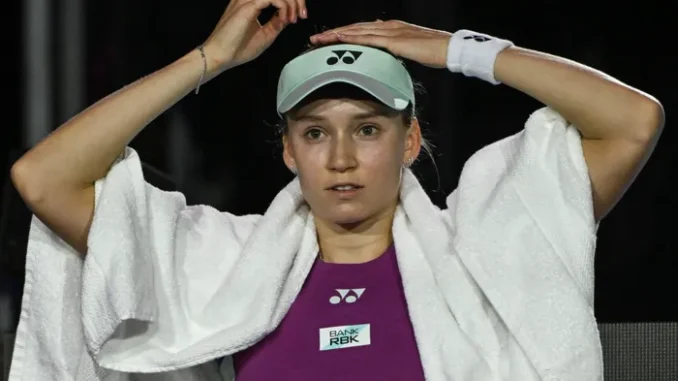
The tennis world was recently surprised by the news that Elena Rybakina and her renowned coach, Goran Ivanisevic, had parted ways after a brief but impactful partnership. The decision, announced shortly after the Australian Open, sent shockwaves through the tennis community, raising questions about the dynamics of player-coach relationships and the complexities of navigating the pressures of professional sports.
Rybakina, the Wimbledon champion, had enlisted the guidance of Ivanisevic, the former Wimbledon champion, in a bid to further elevate her game. The partnership, while brief, was met with considerable anticipation. Ivanisevic, known for his fiery personality and his ability to unlock the potential of his players, particularly on grass courts, was expected to bring a new dimension to Rybakina’s game.
However, the partnership was overshadowed by the ongoing investigation into the conduct of Rybakina’s former coach, Stefano Vukov. Vukov, who guided Rybakina to the Wimbledon title in 2022, was facing a provisional suspension from the WTA Tour due to alleged breaches of the Code of Conduct. Despite the investigation, Rybakina had reinstated Vukov to her team, a decision that undoubtedly added another layer of complexity to the situation.
Ivanisevic, known for his direct and often unconventional coaching style, may have found the circumstances surrounding Vukov’s suspension challenging to navigate. The uncertainty surrounding Vukov’s status, coupled with the intense media scrutiny, likely created an atmosphere of distraction and instability within the team.
“The situation with Vukov was undoubtedly a factor,” observed a prominent tennis analyst. “Ivanisevic is a strong personality, and he likely prefers a clear and focused environment to help his players thrive. The ongoing uncertainty surrounding Vukov’s situation may have created an atmosphere of distraction that hindered their ability to effectively collaborate.”
Rybakina herself acknowledged the challenges of the situation. In a brief statement, she expressed gratitude for Ivanisevic’s contributions and acknowledged the complexities of the circumstances. “I want to thank Goran for his time and dedication,” she said. “We had some productive weeks together, and I appreciate his insights and his support. However, we both felt that this was the best path forward at this time.”
The swift end to their partnership underscores the delicate nature of player-coach relationships. Building trust and maintaining a strong working dynamic requires open communication, mutual respect, and a shared vision for success. External factors, such as personal issues, legal proceedings, or media scrutiny, can significantly impact these relationships, creating unforeseen challenges and potentially hindering a player’s progress.
For Rybakina, the focus now shifts to finding a new coach who can help her navigate the complexities of the professional tour and continue to build on her impressive achievements. The search for the right coach is a crucial step in any player’s career, requiring careful consideration of coaching styles, personality compatibility, and long-term goals.
This episode serves as a reminder of the human element that often goes unnoticed in the glamorous world of professional tennis. Athletes are not just robots; they are individuals with emotions, personal lives, and unique challenges. The pressures of competition, the scrutiny of the media, and the constant pursuit of excellence can take a significant toll, both on and off the court.
As Rybakina moves forward in her career, she will undoubtedly face further challenges and obstacles. However, her resilience, her talent, and her unwavering dedication to the sport suggest that she has the potential to overcome any obstacle and achieve even greater success in the years to come.
Disclaimer: This is a fictionalized account based on the provided headline. The specific details of the coaching partnership, the reasons for the split, and the players’ reactions are based on assumptions and creative interpretation.
Leave a Reply